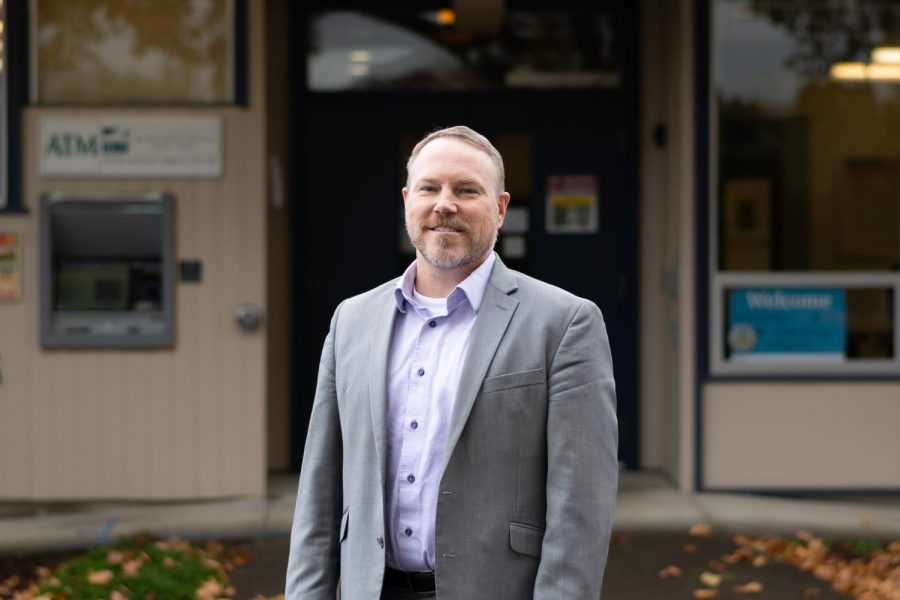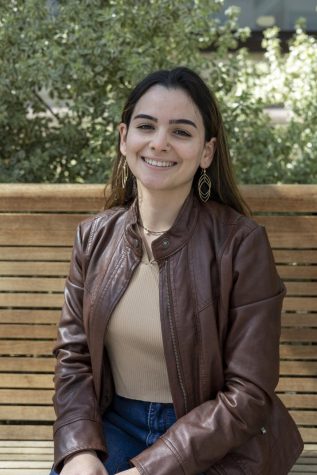CSD parents respond to discussions of potential vaccine mandate
Corvallis School District’s Superintendent, Ryan Noss, pictured in front of the district’s administration building on Monday, Nov. 1st. Noss said CSD’s goal is to “keep schools open and kids in school” during the COVID-19 pandemic.
November 18, 2021
Correction: This story originally incorrectly stated that Corvallis School District Superintendent Ryan Noss introduced a resolution to the Corvallis School Board regarding a potential COVID-19 vaccine mandate, and stated that the school board voted on it. The correct information is that Noss introduced a recommendation, and the school board did not vote on it. The Barometer regrets this error.
The Corvallis School District may be discussing a COVID-19 vaccine mandate in the future, and responses from parents to a potential mandate are mixed.
Superintendent of the Corvallis School District Ryan Noss introduced a recommendation before the school board met on Oct. 14 to implement “all reasonable measures requiring all eligible CSD students to receive the COVID-19 vaccine, excluding those students with qualified exemptions under current immunization policies, as a mandatory precondition to accessing CSD in-person programs and facilities.”
The board, though they expressed support for the recommendation, according to Noss, did not take a vote on it. The school district has started outreach which includes three vaccine clinics every week. Over the next few days, there are vaccine events occurring at the Boys and Girls Club in Corvallis, Ore., Philomath High School, Monroe High School and North Albany Middle School.
Noss said after some outreach is completed, the board may discuss a COVID-19 vaccine mandate at a future meeting.
“The goal is to keep schools open, and kids in school,” Noss said.
Jillian St. Jacques is program coordinator for the applied journalism program at Oregon State University and a parent of two kids at CSD. St. Jacques said he and his family “danced under the stars” when CSD announced they would have school in person once again for fall 2021.
“Kids need to socialize, they are hard-wired to play,” St. Jacques said. “They learn some of their most valuable lessons through group interaction.”
St. Jacques is in favor of the vaccine mandate for CSD. His daughter is under 12 and has yet to be vaccinated due to the vaccine not previously being available to her age group.
The Pfizer vaccine has recently been approved, however, for Emergency Use Authorization for kids ages 5 to 11 as of Oct. 29, and the Centers for Disease Control and Prevention director recommended Pfizer’s COVID-19 vaccine for children 5 to 11 on Nov. 2.
“Everyone, everywhere should want to keep kids from getting sick,” St. Jacques said. “Vaccines are clearly the best way… And the thought that my daughter might wind up dead from COVID-19 because some yahoo doesn’t want to vaccinate his kid is maddening to me.”
St. Jacques said his two kids are a soccer player and a cross country runner, so when the CSD approved middle schools to bring back their sports program, it was a big deal for them.
“After that long hiatus from socializing, they needed team sports!” St. Jacques said.
Theresa Hogue, a public information representative at OSU University Relations and Marketing, who stressed she is speaking only as a CSD parent, said she is eager to get her fourth-grade son vaccinated as soon as possible so he can have “a little more freedom and a lot more protection.”
Hogue said she is concerned about other illnesses such as the cold or the flu that would show symptoms similar to COVID-19’s symptoms. According to Hogue, this is inconvenient for folks who work full-time and cannot get their kids adequate child care in Corvallis due to the nationwide child care crisis, as well as folks who are socioeconomically disadvantaged.
“COVID-19 statistically impacts disadvantaged groups at a higher rate, especially people of color, due in large part to historic disparities in health care for people of color,” Hogue said. “Lowering the rate of COVID-19 transmission will help protect not only those people with weaker immune systems but also more broadly protects the community.”
Anna Burnett, parent to four children between the ages of six and 12, said the parental decision to vaccinate her kids is “extremely personal.” Burnett said she is concerned about the way the mRNA vaccine will impact her developing children.
Burnett said her concern stems from the Food and Drug Administration “Vaccines and Related Biological Products Advisory Committee Meeting Document” from Oct. 26, which states: “The number of participants in the current clinical development program is too small to detect any potential risks of myocarditis associated with vaccination.”
The CDC is currently monitoring reports of myocarditis, which is inflammation of the heart muscle, and pericarditis, which is inflammation of the membrane around the heart.
Thus far, the CDC has found that the “rarely reported” cases of myocarditis have occurred after mRNA COVID-19 vaccination—Pfzier-BioNTech or Moderna—particularly in male adolescents and young adults.
However, the CDC also notes that most patients with myocarditis or pericarditis responded well to medicine and “felt better quickly.”
“I support vaccinations for health, but not at the unrecoverable price of losing freedom,” Burnett said.
According to Hogue, COVID-19’s risk to kids is higher than many other diseases that already require vaccinations. “The benefits of the vaccine for kids far outweighs the risk, which was made clear by the CDC today [Nov. 2],” Hogue said.



















































































![Newspaper clipping from February 25, 1970 in the Daily Barometer showing an article written by Bob Allen, past Barometer Editor. This article was written to spotlight both the student body’s lack of participation with student government at the time in conjunction with their class representatives response. [It’s important to note ASOSU was not structured identically to today’s standards, likely having a president on behalf of each class work together as one entity as opposed to one president representing all classes.]](https://dailybaro.orangemedianetwork.com/wp-content/uploads/2025/03/Screenshot-2025-03-12-1.00.42-PM-e1741811160853.png)
























